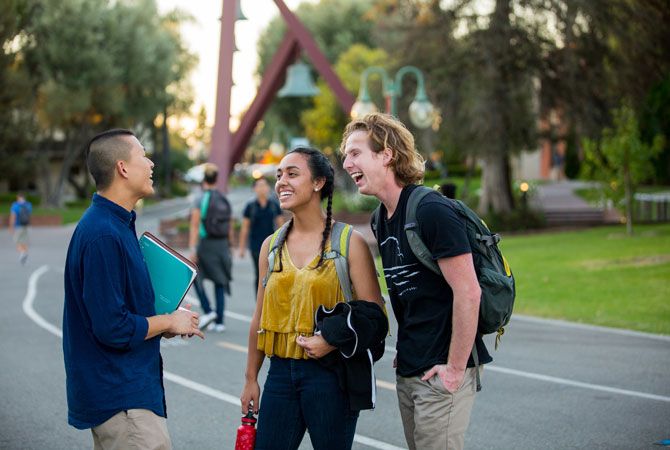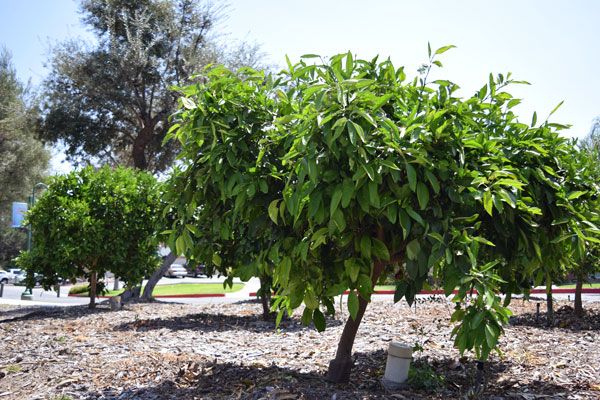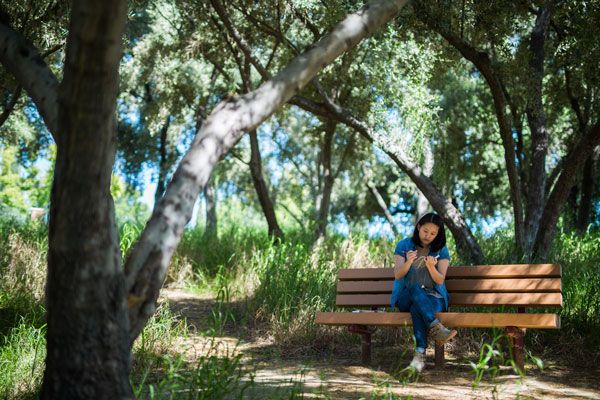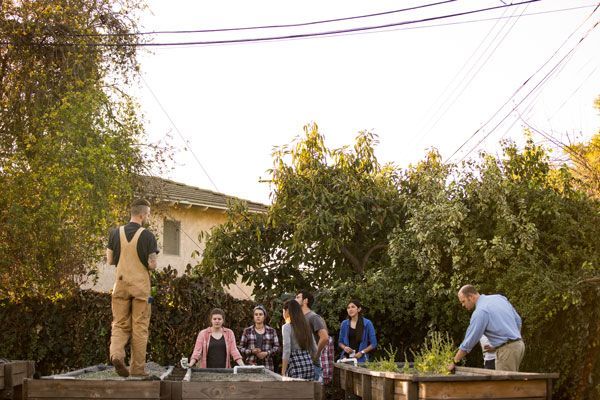
Campus Culture
As a community at Biola, there is a growing understanding of how the secular concept of sustainability can align with and play a role in how our Creation stewardship responsibilities are fulfilled, both corporately and as individuals.
Learn more about the on-campus initiatives that provide opportunities for the Biola community to get involved and learn how to practically apply principles of sustainability.
Biola Food Forest Orchard
The Biola Food Forest Orchard is home to about a dozen citrus trees of various types and several avocado trees. The current "food forest" is just the first step towards a larger vision — creating a space that supports an array of food sources.
This space uses much less water than a conventional lawn, does not require regular maintenance (mowing, blowing and such), sequesters carbon rather than burning it (in the form of the branches and leaves of the actual trees themselves and the carbon being pumped into the soil profile by the root exudates), cleans the air, cools that section of campus, and provides an ever growing amount of fruit with each passing year. More than being sustainable, the goal is to be regenerative, making the soil and the area better with each passing year. By mulching with wood chips recycled from campus tree trimming, Biola keeps the valuable mulch from landfills and uses it on our own campus saving water and feeding the soil. This further sequesters carbon and adds to the soil fertility.
Ultimately, the goal is to plant multiple support species as ground cover, plant additional edible plants, as well as provide seating for people to come into the orchard and enjoy the space. In addition, we aim to create simple earthworks to capture rainwater rather than allowing it to quickly runoff to the street. The three S’s of rainwater management (slow, spread and sink) help to keep water in this local soil profile. In addition, we would like to plant a variety of perennial herbs for the cafe to utilize.

Olive Grove Park
The historical Olive Grove contains 60 olive trees originating from the orchard Andrew McNally planted in the 1880s. When Biola moved from downtown Los Angeles, La Mirada was one of the world’s leading olive oil producers. The combination of pollution and city congestion in Los Angeles pushed Biola to move towards a calmer, cleaner suburban city. In 1957, when Biola broke ground for the new campus, the rolling hills were dotted with olive trees.
This refurbished Olive Grove landmark serves as a reminder of Biola’s heritage in La Mirada. Funded entirely by parent donations and friends of the university, the Olive Grove is connected to campus by a new 95-foot bridge. To make this historic old grove into a park the area was cleared of overgrowth, then new benches, water permeable pathways and lighting were installed. The site has been transformed into a student haven for studying, prayer and ultimately an environment of peace and solitude — a rarity on busy university campuses.

Biola Organic Garden
Since its inception in January 2009, the Biola Organic Garden has engaged hundreds of Biola students, staff and local community members in the process of growing hundreds of pounds of produce in an organic and sustainable manner. We believe that good food is fundamental to good health and a vibrant community.
The goal of the garden is two fold. First, we aim to provide an opportunity for students to learn about God’s good creation. The garden is a tool for botany, ecology and environmental science students to study plant physiology, agriculture, soil ecology as well as native plant and animal life. Second, we aim to use the garden as a means to better steward the resources that exist on Biola's campus. We grow food to distribute to the student body in conjunction with Bon Appetit and to the poor in La Mirada through the Grace EV Free Church Food Bank. We also recycle landscaping and kitchen/coffee waste in order to save the university the cost of removing this waste from campus while at the same time increasing the soil fertility in the garden. These efforts have kept several tons of organic waste from leaving campus over the last 8 years.
The Biola Organic Garden has received widespread support across the Biola community. The biology department paid for start-up equipment and supports our regular operating expenses. University end of year surplus grants paid have paid for several “big ticket” items such as a storage shed, chipper and tiller. Bon Appetit very generously donated money for our drip irrigation system and greenhouse and paid a part-time employee for two years. Additionally, a local individual donated an aquaponics system that produces dozens of tilapia fish and hundreds of pounds of vegetables each year.

Creation Stewardship Committee
This university-sanctioned committee has been meeting for four years. Members are students (undergraduate and graduate), faculty (Biology, ICS, English, Bible), and staff (Facilities). The Creation Stewardship Committee meets periodically to discuss issues related to sustainability on campus and the care and improvement of Biola’s campus environment. The committee works with student groups from the sciences and campus environmental clubs in support of things like Creek Clean-ups, Earth Week activities, etc.
The committee makes recommendations and assists the administrative and academic departments in reducing and mitigating harmful environmental effects of its operations. Important not only because of its inherent value but also because it can help to reduce costs, and promote environmental sensitivity across and beyond campus. It strives to demonstrate the university’s commitment and care for that part of God’s creation He has entrusted to us”.
